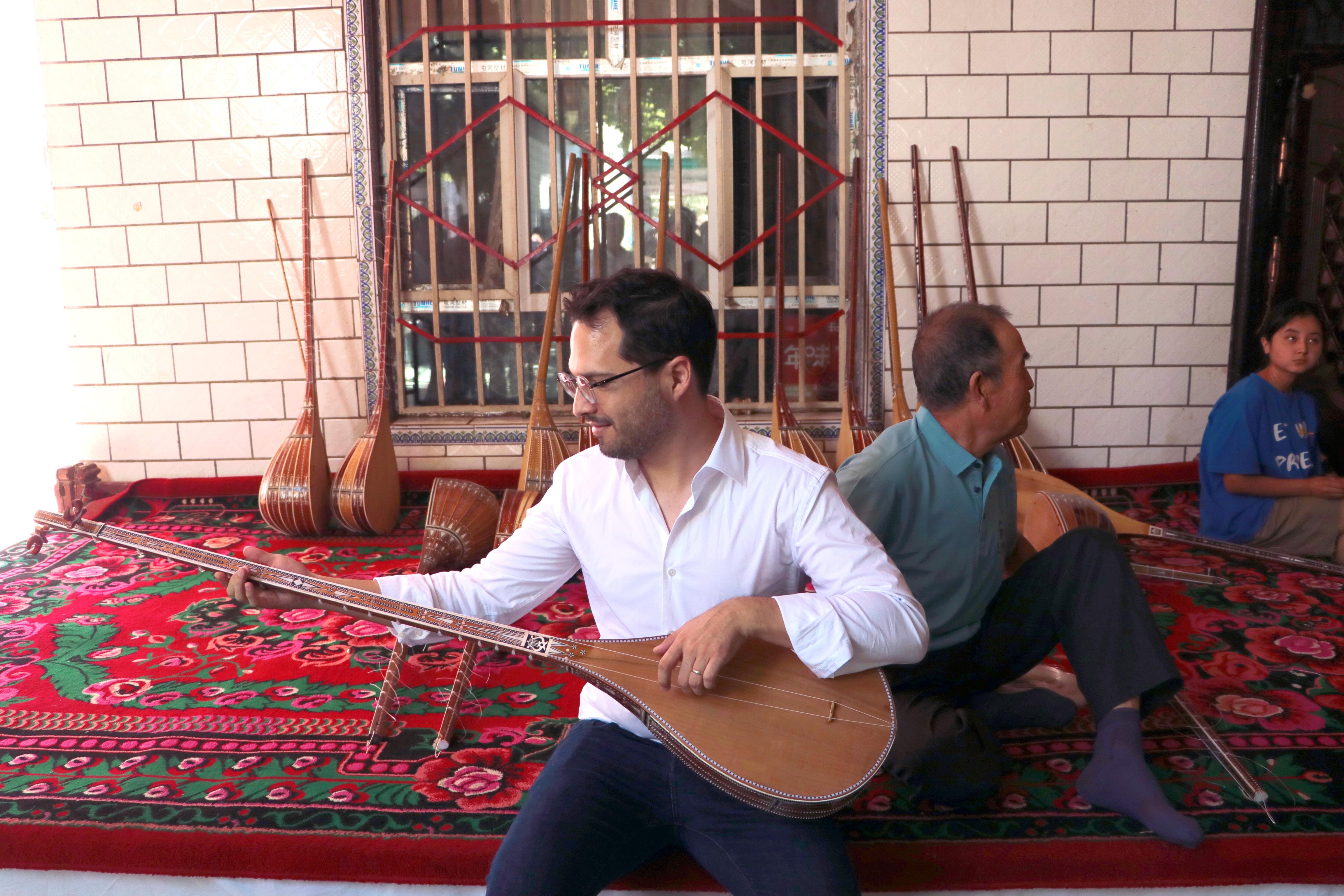 Hector Dorbecker, minister at the Mexican Embassy in China, tries his hand at playing the dutar, a two-stringed Uygur musical instrument, in Xinhe county, Xinjiang Uygur autonomous region, on Aug 2. (PHOTO / XINHUA)
Hector Dorbecker, minister at the Mexican Embassy in China, tries his hand at playing the dutar, a two-stringed Uygur musical instrument, in Xinhe county, Xinjiang Uygur autonomous region, on Aug 2. (PHOTO / XINHUA)
Foreign envoys have said that the Xinjiang Uygur autonomous region is witnessing increasing economic and cultural exchanges with countries involved in the Belt and Road Initiative, and they expect more BRI cooperation, particularly with Xinjiang, to revive the centuries-old Silk Road.
The diplomats made the remarks during a recent trip to the region, which has played a pivotal role in Belt and Road cooperation. Envoys from 25 countries participated in the event.
Mohsen Bakhtiar, the Iranian ambassador to China, said that Iran and China, as two great Asian civilizations, have been in contact with each other for thousands of years through the ancient Silk Road.
"Today, the Silk Road has emerged in the form of the Belt and Road Initiative," he said, noting that his country is connected to both Xinjiang and the broader Chinese landscape through the BRI platform.
"Iran is seeking to revive the historical role it played in connecting transportation between China, West Asia and Europe in the modern era. The country is focusing on fostering deeper economic, cultural and social partnerships with Xinjiang,"Bakhtiar said.
Customs statistics from Urumqi, the regional capital, showed that Xinjiang has witnessed strong economic and trade exchanges with countries along the Belt and Road in the first half of this year, with the trade between the region and the countries reaching 138.3 billion yuan ($19.1 billion) as of June, a year-on-year increase of 68.2 percent.
The ambassador said that the establishment and continuity of the Silk Road over many centuries can be attributed to the peace and security that Xinjiang has ensured for this route. "And this security has been achieved as a result of tolerance, respect for cultural differences and diversity in beliefs and religions," he said.
Iran signed a memorandum of understanding with China in 2016 to officially participate in the BRI.As of June, China had signed more than 200 BRI cooperation documents with 152 countries and 32 international organizations, according to the National Development and Reform Commission.
Ijaz Ahmad, minister at the embassy of Pakistan in Beijing, said:"We in Pakistan hold China as a development partner. For Pakistan, Xinjiang is of special significance. It is the first nodal point of our CPEC partnership." This year marks the 10th anniversary of the China-Pakistan Economic Corridor, a flagship project of the BRI.
"We hope to see more people-to-people and economic linkages between Xinjiang and its neighboring territories of Gilgit Baltistan in Pakistan for realization of our common objectives of peace and prosperity," Ahmad added.
Batir Tursunov, minister-counselor at the embassy of Uzbekistan in China, said that Xinjiang, which played a crucial role in the ancient links between Uzbekistan and China for centuries along the Silk Road, has become China's important western gateway to Central Asia, the Middle East and Europe.
"Now we are trying to revive this ancient Silk Road through the BRI, not only in terms of political ties but also people-to-people exchanges," he said, expressing his hope for the early construction of the China-Kyrgyzstan-Uzbekistan railway in order to bring more convenience to people.


